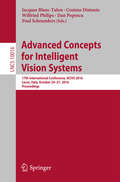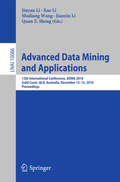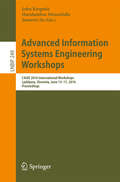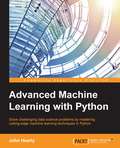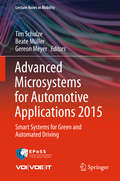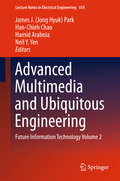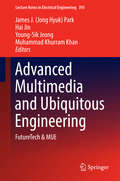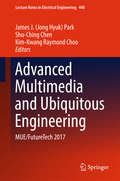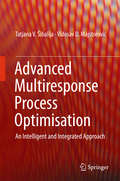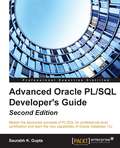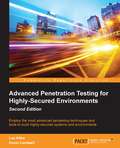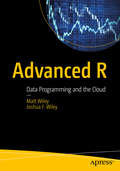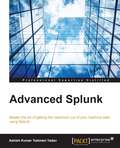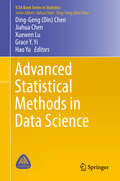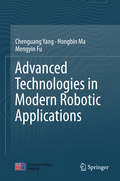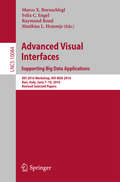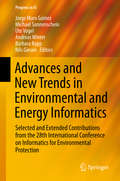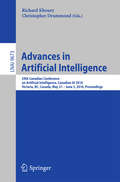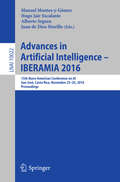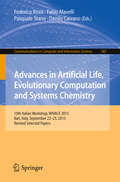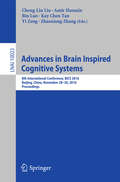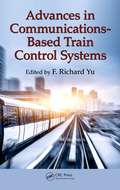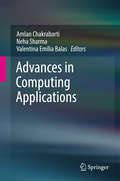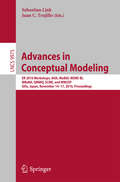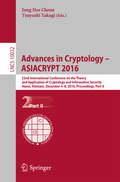- Table View
- List View
Advanced Concepts for Intelligent Vision Systems: 17th International Conference, ACIVS 2016, Lecce, Italy, October 24-27, 2016, Proceedings (Lecture Notes in Computer Science #10016)
by Cosimo Distante Jacques Blanc-Talon Wilfried Philips Dan Popescu Paul ScheundersThis book constitutes the refereed proceedings of the 17th International Conference on Advanced Concepts for Intelligent Vision Systems, ACIVS 2016, held in Lecce, Italy, in October 2016. The 64 revised full papers presented in this volume were carefully selected from 137 submissions. They deal with classical low-level image processing techniques; image and video compression; 3D; security and forensics; and evaluation methodologies.
Advanced Data Mining and Applications: 12th International Conference, ADMA 2016, Gold Coast, QLD, Australia, December 12-15, 2016, Proceedings (Lecture Notes in Computer Science #10086)
by Jinyan Li, Xue Li, Shuliang Wang, Jianxin Li and Quan Z. ShengThis book constitutes the proceedings of the 12th International Conference on Advanced Data Mining and Applications, ADMA 2016, held in Gold Coast, Australia, in December 2016. The 70 papers presented in this volume were carefully reviewed and selected from 105 submissions. The selected papers covered a wide variety of important topics in the area of data mining, including parallel and distributed data mining algorithms, mining on data streams, graph mining, spatial data mining, multimedia data mining, Web mining, the Internet of Things, health informatics, and biomedical data mining.
Advanced Information Systems Engineering Workshops: CAiSE 2016 International Workshops, Ljubljana, Slovenia, June 13-17, 2016, Proceedings (Lecture Notes in Business Information Processing #249)
by John Krogstie Haralambos Mouratidis Jianwen SuThis book constitutes the thoroughly refereed proceedings of five international workshops held in Ljubljana, Slovenia, in conjunction with the 28th International Conference on Advanced Information Systems Engineering, CAiSE 2016, in June 2016. The 16 full and 9 short papers were carefully selected from 51 submissions. The associated workshops were the Third International Workshop on Advances in Services DEsign based on the Notion of CApabiliy (ASDENCA) co-arranged with the First International Workshop on Business Model Dynamics and Information Systems Engineering (BumDISE), the Fourth International Workshop on Cognitive Aspects of Information Systems Engineering (COGNISE), the First International Workshop on Energy-awareness and Big Data Management in Information Systems (EnBIS), the Second International Workshop on Enterprise Modeling (EM), and the Sixth International Workshop on Information Systems Security Engineering (WISSE).
Advanced Machine Learning with Python
by John HeartySolve challenging data science problems by mastering cutting-edge machine learning techniques in Python About This Book * Resolve complex machine learning problems and explore deep learning * Learn to use Python code for implementing a range of machine learning algorithms and techniques * A practical tutorial that tackles real-world computing problems through a rigorous and effective approach Who This Book Is For This title is for Python developers and analysts or data scientists who are looking to add to their existing skills by accessing some of the most powerful recent trends in data science. If you've ever considered building your own image or text-tagging solution, or of entering a Kaggle contest for instance, this book is for you! Prior experience of Python and grounding in some of the core concepts of machine learning would be helpful. What You Will Learn * Compete with top data scientists by gaining a practical and theoretical understanding of cutting-edge deep learning algorithms * Apply your new found skills to solve real problems, through clearly-explained code for every technique and test * Automate large sets of complex data and overcome time-consuming practical challenges * Improve the accuracy of models and your existing input data using powerful feature engineering techniques * Use multiple learning techniques together to improve the consistency of results * Understand the hidden structure of datasets using a range of unsupervised techniques * Gain insight into how the experts solve challenging data problems with an effective, iterative, and validation-focused approach * Improve the effectiveness of your deep learning models further by using powerful ensembling techniques to strap multiple models together In Detail Designed to take you on a guided tour of the most relevant and powerful machine learning techniques in use today by top data scientists, this book is just what you need to push your Python algorithms to maximum potential. Clear examples and detailed code samples demonstrate deep learning techniques, semi-supervised learning, and more - all whilst working with real-world applications that include image, music, text, and financial data. The machine learning techniques covered in this book are at the forefront of commercial practice. They are applicable now for the first time in contexts such as image recognition, NLP and web search, computational creativity, and commercial/financial data modeling. Deep Learning algorithms and ensembles of models are in use by data scientists at top tech and digital companies, but the skills needed to apply them successfully, while in high demand, are still scarce. This book is designed to take the reader on a guided tour of the most relevant and powerful machine learning techniques. Clear descriptions of how techniques work and detailed code examples demonstrate deep learning techniques, semi-supervised learning and more, in real world applications. We will also learn about NumPy and Theano. By this end of this book, you will learn a set of advanced Machine Learning techniques and acquire a broad set of powerful skills in the area of feature selection & feature engineering. Style and approach This book focuses on clarifying the theory and code behind complex algorithms to make them practical, useable, and well-understood. Each topic is described with real-world applications, providing both broad contextual coverage and detailed guidance.
Advanced Microsystems for Automotive Applications 2015: Smart Systems for Green and Automated Driving (Lecture Notes in Mobility)
by Gereon Meyer Beate Müller Tim SchulzeThis edited volume presents the proceedings of the AMAA 2015 conference, Berlin, Germany. The topical focus of the 2015 conference lies on smart systems for green and automated driving. The automobile of the future has to respond to two major trends, the electrification of the drivetrain, and the automation of the transportation system. These trends will not only lead to greener and safer driving but re-define the concept of the car completely, particularly if they interact with each other in a synergetic way as for autonomous parking and charging, self-driving shuttles or mobile robots. Key functionalities like environment perception are enabled by electronic components and systems, sensors and actuators, communication nodes, cognitive systems and smart systems integration. The book will be a valuable read for research experts and professionals in the automotive industry but the book may also be beneficial for graduate students.
Advanced Multimedia and Ubiquitous Engineering: Future Information Technology Volume 2 (Lecture Notes in Electrical Engineering #354)
by James J. Jong Hyuk Park Han-Chieh Chao Hamid Arabnia Neil Y. YenThis volume brings together contributions representing the state-of-the-art in new multimedia and future technology information research, currently a major topic in computer science and electronic engineering. Researchers aim to interoperate multimedia frameworks, transforming the way people work and interact with multimedia data. This book covers future information technology topics including digital and multimedia convergence, ubiquitous and pervasive computing, intelligent computing and applications, embedded systems, mobile and wireless communications, bio-inspired computing, grid and cloud computing, semantic web, human-centric computing and social networks, adaptive and context-aware computing, security and trust computing and related areas. Representing the combined proceedings of the 9th International Conference on Multimedia and Ubiquitous Engineering (MUE-15) and the 10th International Conference on Future Information Technology (Future Tech 2015), this book aims to provide a complete coverage of the areas outlined and to bring together researchers from academic and industry and other practitioners to share their research ideas, challenges and solutions.
Advanced Multimedia and Ubiquitous Engineering: FutureTech & MUE (Lecture Notes in Electrical Engineering #393)
by James J. Jong Hyuk Park Young-Sik Jeong Hai Jin Muhammad Khurram KhanThis volume presents selected papers from prominent researchers participating in the 11th International Conference on Future Information Technology and the 10th International Conference on Multimedia and Ubiquitous Engineering, Beijing, China, April 20-22, 2016. These large international conferences provided an opportunity for academic and industry professionals to discuss recent progress in the fields of multimedia technology and ubiquitous engineering including new models and systems and novel applications associated with the utilization and acceptance of ubiquitous computing devices and systems. The contributions contained in this book also provide more information about digital and multimedia convergence, intelligent applications, embedded systems, mobile and wireless communications, bio-inspired computing, grid and cloud computing, the semantic web, user experience and HCI, security and trust computing. This book describes the state of the art in multimedia and ubiquitous engineering, and future IT models and their applications.
Advanced Multimedia and Ubiquitous Engineering: MUE/FutureTech 2017 (Lecture Notes in Electrical Engineering #448)
by James J. Jong Hyuk Park Shu-Ching Chen Kim-Kwang Raymond ChooThis volume brings together contributions representing the state-of-the-art in new multimedia and future technology information research, currently a major topic in computer science and electronic engineering. Researchers aim to interoperate multimedia frameworks, transforming the way people work and interact with multimedia data. This book covers future information technology topics including digital and multimedia convergence, ubiquitous and pervasive computing, intelligent computing and applications, embedded systems, mobile and wireless communications, bio-inspired computing, grid and cloud computing, semantic web, human-centric computing and social networks, adaptive and context-aware computing, security and trust computing and related areas. Representing the combined proceedings of the 9th International Conference on Multimedia and Ubiquitous Engineering (MUE-15) and the 10th International Conference on Future Information Technology (Future Tech 2015), this book aims to provide a complete coverage of the areas outlined and to bring together researchers from academic and industry and other practitioners to share their research ideas, challenges and solutions.
Advanced Multiresponse Process Optimisation: An Intelligent and Integrated Approach
by Tatjana V. Šibalija Vidosav D. MajstorovićThis book presents an intelligent, integrated, problem-independent method for multiresponse process optimization. In contrast to traditional approaches, the idea of this method is to provide a unique model for the optimization of various processes, without imposition of assumptions relating to the type of process, the type and number of process parameters and responses, or interdependences among them. The presented method for experimental design of processes with multiple correlated responses is composed of three modules: an expert system that selects the experimental plan based on the orthogonal arrays; the factor effects approach, which performs processing of experimental data based on Taguchi's quality loss function and multivariate statistical methods; and process modeling and optimization based on artificial neural networks and metaheuristic optimization algorithms. The implementation is demonstrated using four case studies relating to high-tech industries and advanced, non-conventional processes.
Advanced Oracle PL/SQL Developer's Guide - Second Edition
by Saurabh K. GuptaMaster the advanced concepts of PL/SQL for professional-level certification and learn the new capabilities of Oracle Database 12c About This Book * Learn advanced application development features of Oracle Database 12c and prepare for the 1Z0-146 examination * Build robust and secure applications in Oracle PL/SQL using the best practices * Packed with feature demonstrations and illustrations that will help you learn and understand the enhanced capabilities of Oracle Database 12c Who This Book Is For This book is for Oracle developers responsible for database management. Readers are expected to have basic knowledge of Oracle Database and the fundamentals of PL/SQL programming. Certification aspirants can use this book to prepare for 1Z0-146 examination in order to be an Oracle Certified Professional in Advanced PL/SQL. What You Will Learn * Learn and understand the key SQL and PL/SQL features of Oracle Database 12c * Understand the new Multitenant architecture and Database In-Memory option of Oracle Database 12c * Know more about the advanced concepts of the Oracle PL/SQL language such as external procedures, securing data using Virtual Private Database (VPD), SecureFiles, and PL/SQL code tracing and profiling * Implement Virtual Private Databases to prevent unauthorized data access * Trace, analyze, profile, and debug PL/SQL code while developing database applications * Integrate the new application development features of Oracle Database 12c with the current concepts * Discover techniques to analyze and maintain PL/SQL code * Get acquainted with the best practices of writing PL/SQL code and develop secure applications In Detail Oracle Database is one of the most popular databases and allows users to make efficient use of their resources and to enhance service levels while reducing the IT costs incurred. Oracle Database is sometimes compared with Microsoft SQL Server, however, Oracle Database clearly supersedes SQL server in terms of high availability and addressing planned and unplanned downtime. Oracle PL/SQL provides a rich platform for application developers to code and build scalable database applications and introduces multiple new features and enhancements to improve development experience. Advanced Oracle PL/SQL Developer's Guide, Second Edition is a handy technical reference for seasoned professionals in the database development space. This book starts with a refresher of fundamental concepts of PL/SQL, such as anonymous block, subprograms, and exceptions, and prepares you for the upcoming advanced concepts. The next chapter introduces you to the new features of Oracle Database 12c, not limited to PL/SQL. In this chapter, you will understand some of the most talked about features such as Multitenant and Database In-Memory. Moving forward, each chapter introduces advanced concepts with the help of demonstrations, and provides you with the latest update from Oracle Database 12c context. This helps you to visualize the pre- and post-applications of a feature over the database releases. By the end of this book, you will have become an expert in PL/SQL programming and will be able to implement advanced concepts of PL/SQL for efficient management of Oracle Database. Style and approach The book follows the structure of the Oracle Certification examination but doesn't restrict itself to the exam objectives. Advanced concepts have been explained in an easy-to-understand style, supported with feature demonstrations and case illustrations.
Advanced Penetration Testing for Highly-Secured Environments - Second Edition
by Kevin Cardwell Lee AllenEmploy the most advanced pentesting techniques and tools to build highly-secured systems and environments About This Book * Learn how to build your own pentesting lab environment to practice advanced techniques * Customize your own scripts, and learn methods to exploit 32-bit and 64-bit programs * Explore a vast variety of stealth techniques to bypass a number of protections when penetration testing Who This Book Is For This book is for anyone who wants to improve their skills in penetration testing. As it follows a step-by-step approach, anyone from a novice to an experienced security tester can learn effective techniques to deal with highly secured environments. Whether you are brand new or a seasoned expert, this book will provide you with the skills you need to successfully create, customize, and plan an advanced penetration test. What You Will Learn * A step-by-step methodology to identify and penetrate secured environments * Get to know the process to test network services across enterprise architecture when defences are in place * Grasp different web application testing methods and how to identify web application protections that are deployed * Understand a variety of concepts to exploit software * Gain proven post-exploitation techniques to exfiltrate data from the target * Get to grips with various stealth techniques to remain undetected and defeat the latest defences * Be the first to find out the latest methods to bypass firewalls * Follow proven approaches to record and save the data from tests for analysis In Detail The defences continue to improve and become more and more common, but this book will provide you with a number or proven techniques to defeat the latest defences on the networks. The methods and techniques contained will provide you with a powerful arsenal of best practices to increase your penetration testing successes. The processes and methodology will provide you techniques that will enable you to be successful, and the step by step instructions of information gathering and intelligence will allow you to gather the required information on the targets you are testing. The exploitation and post-exploitation sections will supply you with the tools you would need to go as far as the scope of work will allow you. The challenges at the end of each chapter are designed to challenge you and provide real-world situations that will hone and perfect your penetration testing skills. You will start with a review of several well respected penetration testing methodologies, and following this you will learn a step-by-step methodology of professional security testing, including stealth, methods of evasion, and obfuscation to perform your tests and not be detected! The final challenge will allow you to create your own complex layered architecture with defences and protections in place, and provide the ultimate testing range for you to practice the methods shown throughout the book. The challenge is as close to an actual penetration test assignment as you can get! Style and approach The book follows the standard penetration testing stages from start to finish with step-by-step examples. The book thoroughly covers penetration test expectations, proper scoping and planning, as well as enumeration and foot printing
Advanced R: Data Programming and the Cloud
by Joshua F. Wiley Matt WileyProgram for data analysis using R and learn practical skills to make your work more efficient. This book covers how to automate running code and the creation of reports to share your results, as well as writing functions and packages. Advanced R is not designed to teach advanced R programming nor to teach the theory behind statistical procedures. Rather, it is designed to be a practical guide moving beyond merely using R to programming in R to automate tasks. This book will show you how to manipulate data in modern R structures and includes connecting R to data bases such as SQLite, PostgeSQL, and MongoDB. The book closes with a hands-on section to get R running in the cloud. Each chapter also includes a detailed bibliography with references to research articles and other resources that cover relevant conceptual and theoretical topics. What You Will Learn Write and document R functions Make an R package and share it via GitHub or privately Add tests to R code to insure it works as intended Build packages automatically with GitHub Use R to talk directly to databases and do complex data management Run R in the Amazon cloud Generate presentation-ready tables and reports using R Who This Book Is For Working professionals, researchers, or students who are familiar with R and basic statistical techniques such as linear regression and who want to learn how to take their R coding and programming to the next level.
Advanced Splunk
by Ashish Kumar YadavMaster the art of getting the maximum out of your machine data using Splunk About This Book * A practical and comprehensive guide to the advanced functions of Splunk,, including the new features of Splunk 6.3 * Develop and manage your own Splunk apps for greater insight from your machine data * Full coverage of high-level Splunk techniques including advanced searches, manipulations, and visualization Who This Book Is For This book is for Splunk developers looking to learn advanced strategies to deal with big data from an enterprise architectural perspective. It is expected that readers have a basic understanding and knowledge of using Splunk Enterprise. What You Will Learn * Find out how to develop and manage apps in Splunk * Work with important search commands to perform data analytics on uploaded data * Create visualizations in Splunk * Explore tweaking Splunk * Integrate Splunk with any pre-existing application to perform data crunching efficiently and in real time * Make your big data speak with analytics and visualizations using Splunk * Use SDK and Enterprise integration with tools such as R and Tableau In Detail Master the power of Splunk and learn the advanced strategies to get the most out of your machine data with this practical advanced guide. Make sense of the hidden data of your organization - the insight of your servers, devices, logs, traffic and clouds. Advanced Splunk shows you how. Dive deep into Splunk to find the most efficient solution to your data problems. Create the robust Splunk solutions you need to make informed decisions in big data machine analytics. From visualizations to enterprise integration, this well-organized high level guide has everything you need for Splunk mastery. Start with a complete overview of all the new features and advantages of the latest version of Splunk and the Splunk Environment. Go hands on with uploading data, search commands for basic and advanced analytics, advanced visualization techniques, and dashboard customizing. Discover how to tweak Splunk to your needs, and get a complete on Enterprise Integration of Splunk with various analytics and visualization tools. Finally, discover how to set up and use all the new features of the latest version of Splunk. Style and approach This book follows a step by step approach. Every new concept is built on top of its previous chapter, and it is full of examples and practical scenarios to help the reader experiment as they read.
Advanced Statistical Methods in Data Science (ICSA Book Series in Statistics)
by Hao Yu Ding-Geng Chen Jiahua Chen Xuewen Lu Grace Y. YiThis book gathers invited presentations from the 2nd Symposium of the ICSA- CANADA Chapter held at the University of Calgary from August 4-6, 2015. The aim of this Symposium was to promote advanced statistical methods in big-data sciences and to allow researchers to exchange ideas on statistics and data science and to embraces the challenges and opportunities of statistics and data science in the modern world. It addresses diverse themes in advanced statistical analysis in big-data sciences, including methods for administrative data analysis, survival data analysis, missing data analysis, high-dimensional and genetic data analysis, longitudinal and functional data analysis, the design and analysis of studies with response-dependent and multi-phase designs, time series and robust statistics, statistical inference based on likelihood, empirical likelihood and estimating functions. The editorial group selected 14 high-quality presentations from this successful symposium and invited the presenters to prepare a full chapter for this book in order to disseminate the findings and promote further research collaborations in this area. This timely book offers new methods that impact advanced statistical model development in big-data sciences.
Advanced Technologies in Modern Robotic Applications
by Chenguang Yang Hongbin Ma Mengyin FuThis book presents in a systematic manner the advanced technologies used for various modern robot applications. By bringing fresh ideas, new concepts, novel methods and tools into robot control, robot vision, human robot interaction, teleoperation of robot and multiple robots system, we are to provide a state-of-the-art and comprehensive treatment of the advanced technologies for a wide range of robotic applications. Particularly, we focus on the topics of advanced control and obstacle avoidance techniques for robot to deal with unknown perturbations, of visual servoing techniques which enable robot to autonomously operate in a dynamic environment, and of advanced techniques involved in human robot interaction. The book is primarily intended for researchers and engineers in the robotic and control community. It can also serve as complementary reading for robotics at the both graduate and undergraduate levels.
Advanced Visual Interfaces. Supporting Big Data Applications: AVI 2016 Workshop, AVI-BDA 2016, Bari, Italy, June 7–10, 2016, Revised Selected Papers (Lecture Notes in Computer Science #10084)
by Marco X. Bornschlegl Felix C. Engel Raymond Bond Matthias L. HemmjeThis book constitutes the thoroughly refereed post-workshop proceedings of the AVI 2016 Workshop on Road Mapping Infrastructures for Advanced Visual Interfaces Supporting Big Data Applications in Virtual Research Environments, AVI-BDA 2016, held in Bari, Italy, in June 2016. The 10 revised full papers in this volume present the elaborated outcome of the initial position papers capturing the results oft the roadmapping discussions in the workshop at which comments of several external reviewers for these full publications were also integrated.
Advances and New Trends in Environmental and Energy Informatics: Selected and Extended Contributions from the 28th International Conference on Informatics for Environmental Protection (Progress in IS)
by Andreas Winter Jorge Marx Gomez Michael Sonnenschein Ute Vogel Barbara Rapp Nils GiesenThis book presents the latest findings and ongoing research in the field of green information systems and green information and communication technology (ICT). It provides insights into a whole range of cross-cutting topics in ICT and environmental sciences as well as showcases how information and communication technologies allow environmental and energy efficiency issues to be handled effectively. The papers presented in this book are a selection of extended and improved contributions to the 28th International Conference on Informatics for Environmental Protection dedicated to ICT for energy efficiency. This book is essential and particularly worth reading for those who already gained basic knowledge and want to deepen and extend their expertise in the subjects mentioned above.
Advances in Artificial Intelligence: 29th Canadian Conference on Artificial Intelligence, Canadian AI 2016, Victoria, BC, Canada, May 31 - June 3, 2016. Proceedings (Lecture Notes in Computer Science #9673)
by Richard Khoury Christopher DrummondThis book constitutes the refereed proceedings of the 29th Canadian Conference on Artificial Intelligence, Canadian AI 2016, held in Victoria, BC, Canada, in May/June 2016. The 12 full papers and 27 short papers presented were carefully reviewed and selected from 97 submissions. The focus of the conference was on the following subjects: actions and behaviours, audio and visual recognition, natural language processing, reasoning and learning, streams and distributed computing.
Advances in Artificial Intelligence - IBERAMIA 2016: 15th Ibero-American Conference on AI, San José, Costa Rica, November 23-25, 2016, Proceedings (Lecture Notes in Computer Science #10022)
by Manuel Montes y Gómez, Hugo Jair Escalante, Alberto Segura and Juan de Dios MurilloThis book constitutes the refereed proceedings of the 15 Ibero-American Conference on Artificial Intelligence, IBERAMIA 2016, held in San José, Costa Rica, in November 2016. The 34 papers presented were carefully reviewed and selected from 75 submissions. The papers are organized in the following topical sections: knowledge engineering, knowledge representation and probabilistic reasoning; agent technology and multi-agent systems; planning and scheduling; natural language processing; machine learning; big data, knowledge discovery and data mining; computer vision and pattern recognition; computational intelligence soft computing; AI in education, affective computing, and human-computer interaction.
Advances in Artificial Life, Evolutionary Computation and Systems Chemistry: 10th Italian Workshop, WIVACE 2015, Bari, Italy, September 22-25, 2015, Revised Selected Papers (Communications in Computer and Information Science #587)
by Pasquale Stano Federico Rossi Fabio Mavelli Danilo CaivanoThis book constitutes the revised selected papers of the 10th Italian Workshop on Advances in Artificial Life, Evolutionary Computation and Systems Chemistry, WIVACE 2015, held at Bari, Italy, in September 2015. The 18 papers presented have been thoroughly reviewed and selected from 45 submissions. They cover the following topics: evolutionary computation, bioinspired algorithms, genetic algorithms, bioinformatics and computational biology, modeling and simulation of artificial and biological systems, complex systems, synthetic and systems biology, systems chemistry.
Advances in Brain Inspired Cognitive Systems: 8th International Conference, BICS 2016, Beijing, China, November 28-30, 2016, Proceedings (Lecture Notes in Computer Science #10023)
by Amir Hussain Yi Zeng Cheng-Lin Liu Bin Luo Kay Chen Tan Zhaoxiang ZhangThis book constitutes the refereed proceedings of the 8th International Conference on Brain Inspired Cognitive Systems, BICS 2016, held in Beijing, China, in November 2016. The 32 full papers presented were carefully reviewed and selected from 43 submissions. They discuss the emerging areas and challenges, present the state of the art of brain-inspired cognitive systems research and applications in diverse fields by covering many topics in brain inspired cognitive systems related research including biologically inspired systems, cognitive neuroscience, models consciousness, and neural computation.
Advances in Communications-Based Train Control Systems
by F. Richard YuWith rapid population explosion, improving rail transit speed and capacity is strongly desirable around the world. Communication-based train control (CBTC) is an automated train control system using high capacity bidirectional train-ground communications to ensure the safe operation of rail vehicles. This book presents the latest advances in CBTC r
Advances in Computing Applications: Proceedings Of The 7th International Workshop Soft Computing Applications (sofa 2016) , Volume 1 (Advances In Intelligent Systems and Computing #633)
by Valentina Emilia Balas Amlan Chakrabarti Neha SharmaThis edited volume presents the latest high-quality technical contributions and research results in the areas of computing, informatics, and information management. The book deals with state-of art topics, discussing challenges and possible solutions, and explores future research directions. The main goal of this volume is not only to summarize new research findings but also place these in the context of past work. This volume is designed for professional audience, composed of researchers, practitioners, scientists and engineers in both the academia and the industry.
Advances in Conceptual Modeling: ER 2016 Workshops, AHA, MoBiD, MORE-BI, MReBA, QMMQ, SCME, and WM2SP, Gifu, Japan, November 14–17, 2016, Proceedings (Lecture Notes in Computer Science #9975)
by Sebastian Link Juan C. TrujilloThis book constitutes the refereed proceedings of seven workshops and a symposium, held at the 35th International Conference on Conceptual Modeling, ER 2016, in Gifu, Japan. The 19 revised full and 3 keynote papers were carefully reviewed and selected out of 52 submissions to the following events: Conceptual Modeling for Ambient Assistance and Healthy Ageing, AHA 2016; Modeling and Management of Big Data, MoBiD 2016; Modeling and Reasoning for Business Intelligence, MORE-BI 2016; Conceptual Modeling in Requirements and Business Analysis, MREBA 2016; Quality of Models and Models of Quality, QMMQ 2016; and the Symposium on Conceptual Modeling Education, SCME 2016; and Models and Modeling on Security and Privacy, WM2SP 2016.
Advances in Cryptology – ASIACRYPT 2016: 22nd International Conference on the Theory and Application of Cryptology and Information Security, Hanoi, Vietnam, December 4-8, 2016, Proceedings, Part II (Lecture Notes in Computer Science #10032)
by Jung Hee Cheon and Tsuyoshi TakagiThe two-volume set LNCS 10031 and LNCS 10032 constitutes the refereed proceedings of the 22nd International Conference on the Theory and Applications of Cryptology and Information Security, ASIACRYPT 2016, held in Hanoi, Vietnam, in December 2016. The 67 revised full papers and 2 invited talks presented were carefully selected from 240 submissions. They are organized in topical sections on Mathematical Analysis; AES and White-Box; Hash Function; Randomness; Authenticated Encryption; Block Cipher; SCA and Leakage Resilience; Zero Knowledge; Post Quantum Cryptography; Provable Security; Digital Signature; Functional and Homomorphic Cryptography; ABE and IBE; Foundation; Cryptographic Protocol; Multi-Party Computation.
